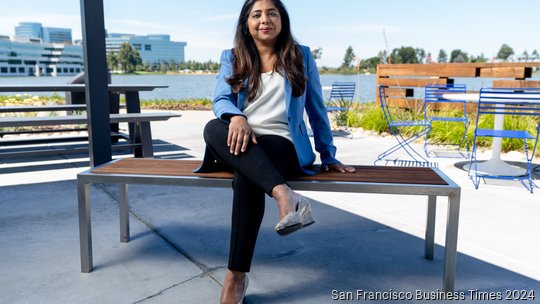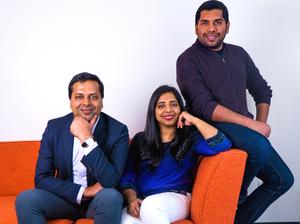
Logistics is a major understated challenge of parenthood. Getting kids to and from school while juggling work and other commitments is a huge cause of stress.
Ritu Narayan founded Zum in 2014 as an Uber-like service for kids while getting her MBA at Stanford. The idea took off among Silicon Valley parents, but Narayan soon set her sights on a bigger fish: school buses, or what she calls “the largest transportation system in the country.”
Zum’s business includes fully electric fleets of school buses paired with digital tools for parents to monitor when and where their kids are traveling. In 2020, Oakland Unified became its first school-district partner.
Now operating in 14 states, working with over 4,000 schools and managing a fleet of 3,000 vehicles and drivers, Zum is the sole bus operator in Oakland with a major presence in San Francisco and other Bay Area cities. Los Angeles is its largest contract.
Bolstered by state and federal grants, the company aims to expand nationwide and eventually internationally with no signs of slowing down. Just this year, the company raised a $114 million Series E round and received a $26 million grant from the EPA.
What was the personal problem that inspired the Zum? I was working at eBay. I had two children, and I was facing this challenge — how to pick them up and drop them off, while you’re still at work, safely and reliably. I tried putting together solutions by myself but nothing would work.
I’m the oldest of four siblings, and growing up, my mom was an educator. She had left her job for the exact same reason. It was kind of an “aha moment” that this happened to her miles away while I was here in the center of Silicon Valley where transformations are happening using technology in every single industry, but nothing had changed in this area.
How did the company pivot from being an “Uber for kids” to providing school transportation services? We used to have a network of highly certified drivers who had their own vehicles. We had the technology to match the right driver to the right ride, while making sure all the trust and safety and logistics were taken care of. The demand for that was very high.
When we launched in 2016, we went to schools asking them to promote the solution to their parents. And the school said, “We are nonprofit, we cannot promote any single solution, but your solution is so thoughtfully designed that we can use it for all our own internal purposes, like intercampus rides, or picking kids up from certain things.” And that’s what led us to pivot into busing.
How does electrification play a role in Zum’s mission? There are half a million school buses in the country. And a couple of weeks back, we announced that Oakland was the first major school district in the country to be 100% electric. And what’s most unique about it is it’s not just that there are 74 buses, all EVs, but these buses are capable of bidirectional charging. So these buses, when they are not used for transportation in the evening or summer, which is also the peak demand for energy, they are able to provide energy back to the grid.
How did Zum navigate the challenges of the Covid-19 pandemic? We were already leaning towards school districts when the pandemic hit. We took a few months when the school districts were off to upgrade technology and to win contracts. We always had the scale for consumers, but we made it more robust for the needs of enterprise and school districts.
How does your electric bus system work? We are providing transportation as a service to school districts. Think of us like (Amazon Web Services) for student transportation. Districts give us the entire contract for doing transportation, then we have to get the school buses, we get the location or yard to store the school buses, we hire the drivers. We have the technology to bring every single stakeholder from students to parents to school district administrators to drivers — everybody is on the same technology and we optimize and design the system in such a way that it’s very transparent and reduces commute time for students.
Who manufactures the buses? Given that our mission is to accelerate the energy transition, we work with almost all vendors in the space who are manufacturing electric buses. Our criteria is safety and reliability. We do extensive testing in the Bay area and beyond. These buses are not only efficient but their batteries are able to supply energy back to the grid.
How reliant is your business model on grants from the EPA and other agencies? We designed the business model to be not reliant on grants in the long term. Our core philosophy is that market-driven forces should determine the business. But you have to activate the market given that there is this cycle where nobody’s placing orders in bulk, so manufacturing is expensive. And that’s why buses are expensive. You have to break the cycle.
Here, the grants are very helpful. They can accelerate manufacturing, they can accelerate charging innovation and everything else. We totally believe that battery prices are falling at a very fast pace. Batteries that cost around $80,000 I expect to be less than $5,000 in the next few years. That’s the piece that will drive the price of the buses down. Once that happens, it is all about having the technology expertise in making these deployments happen at scale. That’s where Zum is a pioneer and leader.
About Ritu Narayan
- Age: 50
- Hometown: Delhi, India
- Residence: San Carlos
- Education: MBA, Stanford University; bachelor’s, Delhi Institute of Technology
- Resume: Group product manager, eBay; lead project manager, Yahoo; principal product manager, Oracle; managing consultant, PricewaterhouseCoopers; senior consultant, IBM
- Favorite Bay Area restaurant: Ettan
About Zum
- Founded: 2014
- HQ: Redwood City
- Employees: 3,000+
- Funding: $350 million, including a $140 million Series E round that valued the company at $1.3 billion in January 2024
- Investors: Sequoia Capital, Softbank, BMW Ventures








